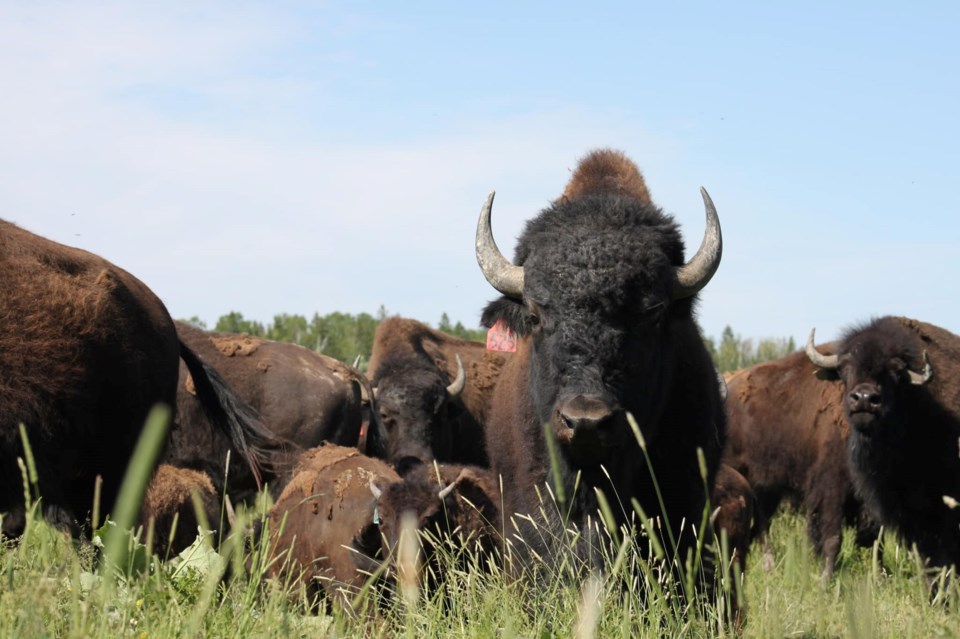A 19-foot steel bison towers over Pierre Bélanger, a symbol of the more than 300 buffalo that roam his 480-acre farmland in Earlton.
Bélanger has been ranching these beasts for 35 years.
The sculpture, built years ago as a symbol of the Bélanger family’s long and storied history in bison ranching, is now a Trans-Canada Highway guidepost to Boréal Cuisine, his newest effort.
Located 20 minutes north of Temiskaming Shores in a town of 1,155 residents, the store specializes in foods grown or processed in Northern Ontario and northwestern Québec. This includes cheese made in Thunder Bay, wild rice grown in Kenora, and of course, bison steaks and burgers made from Bélanger’s own herd at Bison du Nord.
In fact, after nearly four decades of ranching, Bélanger is now learning this consumer-oriented approach may be the future of his historical firm.
“We’re starting to see that this is the way to go,” Bélanger said.
“Our industry is a lot smaller compared to the beef industry, but we’ve spent the last five years developing a stronger brand identity, which is something that, as an industry, we should have done a long time ago."
Previously, the company spent the majority of its existence focused on the sale of live bison all across Canada, Europe and the United States. Bélanger has spent the last several years changing the focus of Bison du Nord toward consumer-oriented products.
While working with various local chefs, processors and producers, he’s devised new food items, including eight varieties of dinner sausages, bison jerky and “bisonettes,” or bison pepperettes.
Bélanger was one of the first bison ranchers in Canada following the reclassification of bison from wild game to domestic livestock in the early 1970s. He said the industry has recently begun realizing the need to look at appealing to the domestic markets.
This drastic switch has been precipitated by changes in modern lifestyles, the absence of independent butchers who can purchase and process whole bison carcasses, and other unpredictable events, such as the recent BSE or “mad cow” crisis
Despite his long years of experience, Bélanger is now discovering the hardest part about the job isn’t managing the herd, but navigating the challenges of the food industry.
The need for large chain grocery stores to maintain standardization in taste, packaging and other factors make it difficult for small regional producers, he said. For example, even slight changes in diet can alter the flavour of a cut of bison meat.
This has required Bélanger to look into establishing Boréal Cuisine, a smaller-scale, “general store” style outlet, which he hopes will appeal to the growing number of Northerners looking to buy food produced in the North. An online component will allow customers unwilling to make the drive to Earlton to still be able to purchase sausages, steaks, and more.
In time, he hopes to be able to convince smaller, more independent Northern retailers to carry his products, while also looking to appeal to the corporate market as a fundraising tool.
Refining bison-meat recipes may perhaps seem an odd turn for someone who was a sociology professor at Sudbury's Laurentian University before embarking on a three-decade-long journey as a bison rancher.
To hear Bélanger tell it, the move to ranching was done “on a dare,” where he and his business-oriented father were jokingly teased by local farmers about working more with their heads than their hands.
This was at a time where “alternative meats” were seeing a surge in popularity, and while the likes of elk, ostrich and wild boar have since fallen by the wayside, bison has survived.
Ever the entrepreneur, Bélanger now oversees not only his thriving bison ranching business with his wife and three children, but he also runs a prosperous RV business known as Earlton RV. Yet, even in the vehicle business, the bison icon stands as the company logo and family trademark.
“The bison is part and parcel of everything we do,” he said. “We love the animal, and it’s unquestionably become part of who we are.”




